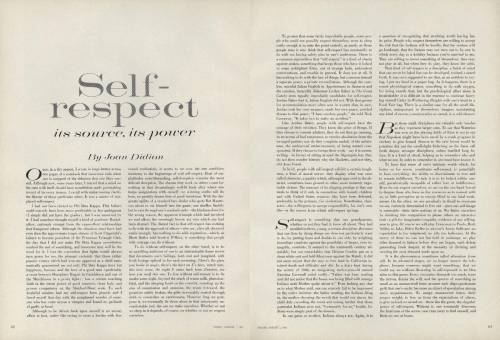Once, In A Dry Season, I Wrote In Large Letters Across Two Pages Of A Notebook That Innocence Ends When


Once, in a dry season, I wrote in large letters across two pages of a notebook that innocence ends when one is stripped of the delusion that one likes oneself. Although now, some years later, I marvel that a mind on the outs with itself should have nonetheless made painstaking record of its every tremor, I recall with embarrassing clarity the flavor of those particular ashes. It was a matter of misplaced self-respect. I had not been elected to Phi Beta Kappa. This failure could scarcely have been more predictable or less ambiguous (I simply did not have the grades), but I was unnerved by it; I had somehow thought myself a kind of academic Raskolnikov, curiously exempt from the cause-effect relationships that hampered others. Although the situation must have had even then the approximate tragic stature of Scott Fitzgerald’s failure to become president of the Princeton Triangle Club, the day that I did not make Phi Beta Kappa nevertheless marked the end of something, and innocence may well be the word for it. I lost the conviction that lights would always turn green for me. Although to be driven back upon oneself is an uneasy affair at best, rather like trying to cross a border with borrowed credentials, it seems to me now the one condition necessary to the beginnings of real self-respect. Most of our platitudes notwithstanding, self-deception remains the most difficult deception. The charms that work on others count for nothing in that devastatingly well-lit back alley where one keeps assignations with oneself: no winning smiles will do here, no prettily drawn lists of good intentions.The dismal fact is that self-respect has nothing to do with the approval of others—who are, after all, deceived easily enough. To do without self-respect, on the other hand, is to be an unwilling audience of one to an interminable home movie that documents one’s failings, both real and imagined, with fresh footage spliced in for each screening. To live without self-respect is to lie awake some night, beyond the reach of warm milk, phenobarbital, and the sleeping hand on the coverlet, counting up the sins of commission and omission, the trusts betrayed, the promises subtly broken, the gifts irrevocably wasted through sloth or cowardice or carelessness. However long we postpone it, we eventually lie down alone in that notoriously un- comfortable bed, the one we make ourselves. Whether or not we sleep in it depends, of course, on whether or not we respect ourselves. There is a common superstition that “self-respect” is a kind of charm against snakes, something that keeps those who have it locked in some unblighted Eden, out of strange beds, ambivalent conversations, and trouble in general. It does not at all. It has nothing to do with the face of things, but concerns instead a separate peace, a private reconciliation. People with self-respect have the courage of their mistakes. They know the price of things. In brief, people with self-respect exhibit a certain toughness, a kind of moral nerve; they display what was once called character, a quality which, although approved in the abstract, sometimes loses ground to other, more instantly negotiable virtues. Nonetheless, character — the willingness to accept responsibility for one’s own life — is the source from which self-respect springs. To have that sense of one’s intrinsic worth which, for better or for worse, constitutes self-respect, is potentially to have everything: the ability to discriminate, to love and to remain indifferent. To lack it is to be locked within oneself, paradoxically incapable of either love or indifference. If we do not respect ourselves, we are on the one hand forced to despise those who have so few resources as to consort with us, so little perception as to remain blind to our fatal weaknesses. On the other, we are peculiarly in thrall to everyone we see, curiously determined to live out—since our self-image is untenable—their false notions of us. We flatter ourselves by thinking this compulsion to please others an attractive trait: a gift for imaginative empathy, evidence of our willingness to give. At the mercy of those we can not but hold in contempt, we play roles doomed to failure before they are begun, each defeat generating fresh despair at the necessity of divining and meeting the next demand made upon us. It is the phenomenon sometimes called alienation from self. In its advanced stages, we no longer answer the telephone, because someone might want something; that we could say no without drowning in self-reproach is an idea alien to this game. Every encounter demands too much, tears the nerves, drains the will, and the spectre of something as small as an unanswered letter arouses such disproportionate guilt that one’s sanity becomes an object of speculation among one’s acquaintances. To assign unanswered letters their proper weight, to free us from the expectations of others, to give us back to ourselves—there lies the great, the singular power of self-respect. Without it, one eventually discovers the final turn of the screw: one runs away to find oneself, and finds no one at home. In memory of the great Joan Didion: On Self-Respect.
More Posts from Slim-k-d and Others


Item: big jar of serotonin

Pius XII - the Pope who exploded!
The embalming of Pope Pius XII in October 1958 was so botched by his doctor that this much loved pope exploded while on public view in the Vatican
One of the most botched examples of embalming in history with catastrophic results was that of Pope Pius XII when he died in October 1958. Dead popes are put on display and processed before an elaborate burial. Therefore they need to look presentable. Unfortunately for Pius XII, his doctor was clueless when it came to embalming and made it up as he went along. The result of this? Pope Pius XII…

View On WordPress

Odd, how the United States doesn't have enough money to give sick veterans healthcare, impoverished seniors Social Security, or hungry schoolkids lunches, but it does have enough money to pay a Central American dictator millions to torture American residents in his brutal concentration camp.

It's an open notes test and some dense motherfuckers still can't figure out the answers.
To ravish
It is easy to make light of this kind of “writing,” and I mention it specifically because I do not make light of it all: it was at Vogue that I learned a kind of ease with words (as well as with people who hung Stellas in their kitchens and went to Mexico for buys in oilcloth), a way of regarding words not as mirrors of my own inadequacy but as tools, toys, weapons to be deployed strategically on a page. In a caption of, say, eight lines, each line to run no more or less than twenty-seven characters, not only every word but every letter counted. At Vogue one learned fast, or one did not stay, how to play games with words, how to put a couple of unwieldy dependent clauses through the typewriter and roll them out transformed into one simple sentence composed of precisely thirty-nine characters. We were connoisseurs of synonyms. We were collectors of verbs. (I recall “to ravish” as a highly favored verb for a number of issues, and I also recall it, for a number of issues more, as the source of a highly favored noun: “ravishments,” as in tables cluttered with porcelain tulips, Faberge eggs, other ravishments.) We learned as reflex the grammatical tricks we had learned only as marginal corrections in school (“there are two oranges and an apple” read better than “there were an apple and two oranges,” passive verbs slowed down sentences, “it” needed a reference within the scan of the eye), learned to rely on the OED, learned to write and rewrite and rewrite again. “Run it through again, sweetie, it’s not quite there.” “Give me a shock verb two lines in.” “Prune it out, clean it up, make the point.” Less was more, smooth was better, and absolute precision essential to the monthly grand illusion. Going to work for Vogue was, in the late nineteen-fifties, not unlike training with the Rockettes. Telling Stories, Let Me Tell You What I Mean, Joan Didion.

Nobody:
JD Vance:

Fuck it, I said to them all, a radical surgeon of my own life. Never discuss. Cut.
Joan Didion, Play It As It Lays
-
 slim-k-d reblogged this · 3 months ago
slim-k-d reblogged this · 3 months ago -
 slim-k-d liked this · 3 months ago
slim-k-d liked this · 3 months ago -
 birdsinmytree liked this · 4 months ago
birdsinmytree liked this · 4 months ago -
 nitrodose reblogged this · 2 years ago
nitrodose reblogged this · 2 years ago -
 nitrodose liked this · 2 years ago
nitrodose liked this · 2 years ago -
 heavensdarling liked this · 2 years ago
heavensdarling liked this · 2 years ago -
 madwoman5150 reblogged this · 2 years ago
madwoman5150 reblogged this · 2 years ago -
 bettyberttottigoesbothways liked this · 2 years ago
bettyberttottigoesbothways liked this · 2 years ago -
 thingssharonwantstolookat reblogged this · 3 years ago
thingssharonwantstolookat reblogged this · 3 years ago -
 blacksoakedpink liked this · 3 years ago
blacksoakedpink liked this · 3 years ago -
 o-li-ve liked this · 3 years ago
o-li-ve liked this · 3 years ago -
 sw-ampqueen reblogged this · 3 years ago
sw-ampqueen reblogged this · 3 years ago -
 charlottesmetimes liked this · 3 years ago
charlottesmetimes liked this · 3 years ago -
 apocalypticgf liked this · 3 years ago
apocalypticgf liked this · 3 years ago -
 survivalinstinct liked this · 3 years ago
survivalinstinct liked this · 3 years ago -
 eastafriqa liked this · 3 years ago
eastafriqa liked this · 3 years ago -
 thatcollateraldamage reblogged this · 3 years ago
thatcollateraldamage reblogged this · 3 years ago -
 5oclockcoffees reblogged this · 3 years ago
5oclockcoffees reblogged this · 3 years ago
